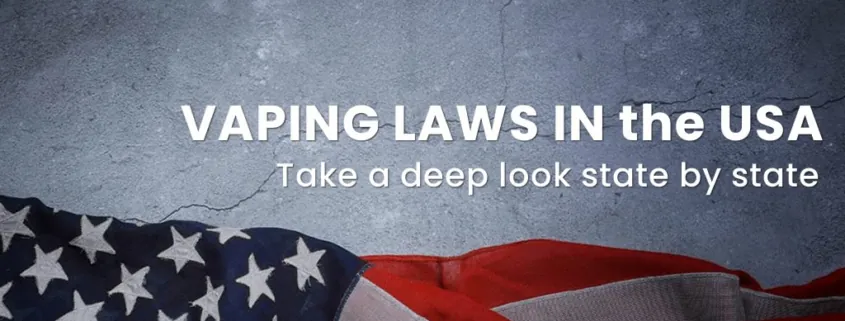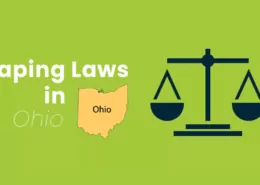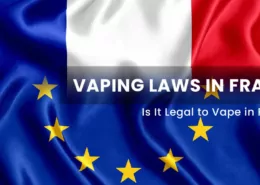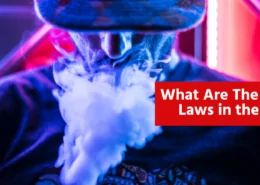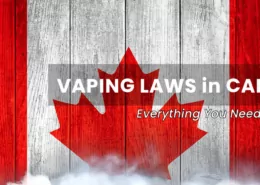Vaping Laws in the U.S. by State
State laws regarding vaping in the United States vary widely. Some states have strict regulations and outright bans on vaping products, while others have more lenient laws. The legal age to purchase vaping products also varies by state, with some states setting the age at 18 and others at 21.
Currently, six states and two territories have banned the sale of all vaping products. These states are Massachusetts, Michigan, Rhode Island, New York, Washington, and Montana, and the territories are Puerto Rico and American Samoa.
Several other states have imposed restrictions on the sale of flavored vaping products, as these are often marketed to young people. For example, California, Oregon, and Washington have banned the sale of flavored vaping products altogether, while other states have restricted the sale of flavored products to specialty stores.
In addition to state laws, there are also federal regulations governing the manufacture and sale of vaping products. The Food and Drug Administration (FDA) has the authority to regulate these products under the Family Smoking Prevention and Tobacco Control Act. However, the FDA has faced criticism for its slow response to the youth vaping epidemic and its failure to effectively regulate the industry.
State Vaping Laws for Consumers
The laws surrounding vaping and e-cigarettes can be complex and challenging to understand. Vape pens come in a variety of forms and can be used for different substances such as tobacco, liquid nicotine, marijuana, and herbs, among others. Moreover, while the federal law permits individuals who are 18 years or older to purchase tobacco products, some states have set the minimum age at 21. Therefore, it is essential to pay close attention to your state’s ever-changing laws to avoid any legal conflict while buying or using e-cigarettes.
Are E-Cigarettes Classified as Tobacco Products?
Determining which laws apply to e-cigarette products often involves understanding whether your state categorizes e-cigarettes as tobacco products. While the Food and Drug Administration (FDA) considers e-cigarettes as tobacco products, many states have yet to define them as such in their laws. It is worth noting that some counties, cities, or municipalities may have their own restrictions on vaping in public places or certain buildings. Therefore, it is crucial to consider local laws and ordinances before using e-cigarettes.
State Vaping and E-Cigarette Laws for Users
Below is a comprehensive list of states where e-cigarettes are considered tobacco products, along with an overview of their specific laws and age restrictions on buying or using vape pens:
| State | Vaping Bans | Are Ecigs Considered as Tobacco Products? | Legal Vaping Age |
| Alabama | Licensed emergency medical providers (Section 420-2-1.28(6)(i)) and licensed daycare facility workers cannot use these products while working (Section 660-5-26.03(4)(k)(10)). | No | Must be 21 years old (Section 28-11-13(a)) |
| Alaska | E-cigarettes banned where smoking is banned (Section 18-35-399(12)). Cannot be used in enclosed public spaces, in prohibited areas, or near children (Section 18-35-301). | No | Must be 19 years old (Section 11-76-105) unless used for medical purposes (Section 11-76-109) |
| Arizona | Banned in foster homes or around foster children (Section 21-6-315) | No | Must be 18 years old (Section 13-3622(A-b)) |
| Arkansas | Cannot use near schools, childcare facilities, or healthcare buildings (Section 26-57-254(b) and 6-21-609(b)). Banned on state college campuses (Section 6-60-804(a)) and state park buildings (Section 013-05.1-1191). | No | Must be 18 years old (Section 5-27-227(b)(1)) |
| California | Banned in youth jails (Section 1712.5(a)). Use is extremely restricted around minors and in public areas. | Yes – Section 22950.5(d)(1)(b) | Must be 21+ or 18 years old in the active military (Sections 22958(a) and 22963(a)). Must be 21+ for mail order service (Section 22963(a-b)). |
| Colorado | Product use banned around minors in public or daycare facilities (Section 25-14-103.5), during driving tests (Section 204-30:8-401(p)), and in assisted living residences (Section 1011-1:7-13.4(A)) | Yes – Section 18-13-121(5) | Must be 18 years old (Sections 18-13-121(1)(a) and 44-7-103(1)) |
| Connecticut | Vaping banned in government, health, and food industries. Banned in hotel/motel rooms. Generally banned around facilities with minors, such as schools. (Section 19a-342a(b-c)) | No | Must be 18 years old (Section 53-344b(b-c)) |
| Delaware | Product use prohibited anywhere smoking is also prohibited (Section 16-2902(12)) | Yes – Section 30-5301(15) | Must be 18 years old (Sections 11-1116(a) and 1118(a)) |
| District of Columbia | Use banned everywhere smoking is also banned (Section 7-1702(7)) | Yes – Section 47-2401(5A) | Must be 21 years old (Section 7-1721.02(a)) |
| Florida | Use banned in enclosed indoor spaces (including cars) and in buildings or vehicles that provide care to adults or children (Section 20(a-b)). Some exceptions may apply. | No | Must be 21 years old (Section 569.42) |
| Georgia | Cannot be used by food service employees unless in a designated smoking area (Section 511-6-1-.03(5)(j)(1)) | No | Must be 18 years old (Section 16-12-171(a)(1)(A)) |
| Hawaii | E-cigarettes and vaping banned in the same places as smoking (Section 328J-1). Use banned in all parks and at all University of Hawaii properties (Section 304A-122(a)). Purchase requires an ID even if using a mail order delivery service (Section 245-17(b)). | Yes – Section 323F-34(d) | Must be 21 years old (Section 712-1258(1) and (5)) |
| Idaho | Shipping products to anyone under 18 is illegal (Section 39-5717A). | No | Must be 18 years old (Sections 39-5705(1) and 39-5714(1)) |
| Illinois | Use banned on college campuses (Section 110-64/10) and at the Capitol Complex (Section 71-2005.40(m)) | No | Must be 21 years old (Section 720-675) |
| Indiana | Age restrictions on use. Mail orders must establish legal age (Section 7.1-7-5.5-3). | Yes – Section 7.1-1-3-47.5(b) | Must be 18 years old (Sections 35-46-1-10(a), 35-46-1-10.2(a), and 35-46-1-10.5(a)) |
| Iowa | Banned on state property, including outdoors, except on select properties on Capitol Complex (State Employee Policy Appendix E). Banned on University of Iowa campus (Section 681-12.6(262)) and in foster homes around foster children (Section 441-113.5(237)(6)(g)). | No | Must be 18 years old (Section 453A.2(1-2)) |
| Kansas | Banned at juvenile corrections facilities and juvenile jails (Section 123-2-111(a)(b)(16)) | No | Must be 18 years old (Section 79-3321(I)) |
| Kentucky | Use prohibited on property owned by the state Executive branch, including vehicles. Banned in some healthcare facilities, veterans’ parks, fairgrounds, and highway rest areas (Section 2014-747). Prohibited in underground mines (Section 352.170(3)). Childcare employees banned from use around children (Sections 922-2:180:5(7)(b) and 2:120:3(10)). | No | Must be 18 years old (Sections 438.310(1), 438.313(1) and 438.315(1)) |
| Louisiana | Banned on school property (Section 17:240(A)(2)) | No | Must be 21 years old (Sections 14:91.8(C), and 14:91.6(A)), unless you are 18 and with a parent or use in a private residence (Section 14:91.8(F)) |
| Maine | Prohibited in the same places smoking is banned (Section 22-1541(6)) and the Wells Reserve aside from the designated smoking areas (Section 94-335-1-1(G)(4)). | Yes – Section 22-1551(3) | Must be 21 years old unless you are already 18 as of July 1, 2018 (Section 22-1555-B(2)) |
| Maryland | N/A | No | Illegal for “minors” (Section 10-107(b)(2),(c)(1)) |
| Massachusetts | Use banned in the same places that smoking is banned (Section 270-22(a)) except for designated smoking areas. Banned at children’s camps (Section 105-430.165). | Yes – Section 270-6 | Must be 21 years old or have turned 18 before December 31, 2018 (Section 940-21.04(3)) |
| Michigan | Smoking is banned in most public places; although Michigan’s Clean Indoor Act has not been amended to prohibit vaping where smoking is banned, East Lansing, Marquette County, and Washtenaw County have ordinances that impose such a ban. Title 18, section 6305 | No | 21 |
| Minnesota | Use banned in child and healthcare businesses, government buildings, Minnesota State Colleges and Universities, public and charter schools, and facilities licensed by the commissioner of health. Some exceptions apply (Section 144.414). Employees of a salon cannot use vaping devices while working (Section R.2105.0375). | Yes – Section 297F.01(19) | Must be 18 years old (Sections 609.685(1)(a) and (2)(a-b)) |
| Mississippi | N/A | No | Must be 18 years old (Section 97-32-51(2)) |
| Missouri | N/A | No | Must be 18 years old (Sections 407.926.1, 407.931.1, and 407.931.3) |
| Montana | N/A | No | Must be 18 years old (Section 16-11-305(1)) |
| Nebraska | Use banned in public places and places of employment (Sections 71-5727 and 71-5729) | No | Must be 18 years old (Sections 28-1419 and 28-1425) |
| Nevada | Limitations on using vape pens or e-cigarettes at a piercing salon (Section 49) | No | Must be 21 years old (Section 202.2493.2) |
| New Hampshire | Use banned in all areas where smoking is also banned (Section 155:66). Banned on the ground of any public educational building (Section 126-K:7(I)). | No | Must be 18 years old (Sections 126-K:4(I) and 126-K:8(I)) |
| New Jersey | Banned in all areas where smoking is banned (Section 26:3D-57), banned in children’s group homes (Section 3A:56-4.6), and restricted in Atlantic City International Airport aside from designated smoking areas. | Yes – Section 54:40B-2 | Must be 21 years old (Sections 2A:170-51.4(a)(2) and 2C:33-13.1(a)) |
| New Mexico | Vaping banned wherever smoking is banned (Section 24-16-13) | Yes | Must be 21 years old (Sections 61-37-2 and 61-37-3) |
| New York | Vaping banned wherever smoking is banned, with some minor exceptions (Section 1399-q) | No | Must be 18 years old (Sections 1399-cc(2) and 1399-bb(4-5)) |
| North Carolina | Use banned in childcare centers, family childcare homes, jail and prison, on school property, and at school events (Section 115C-407) | Yes – Section 14-313(a)(4) | Must be 18 years old (Section 14-313(b)) |
| North Dakota | Use banned everywhere smoking is banned with some exceptions (Section 23-12-09(14)) | No | Must be 18 years old (Section 12.1-31-03(1)(a)) |
| Ohio | Use banned in capitol buildings (Section 128-4-02(G)(9)) and body art/tattoo procedure or equipment sterilization rooms (Section 3701-9-04(K)). Prohibited on the University of Cincinnati campus and various other campuses by policy (Section 3361:10-17-06(B)(1)). | No | Must be 18 years old (Section 2927.02(B)(1)) unless bought with a parent (Section 2151.87(B)) |
| Oklahoma | Banned in any facility used to treat addiction recovery, mental illness, opioid addiction, or other addictive disorder such as gambling (specific laws can be found in Section 450). | No | Must be 21 years old (Section 10A-2-8-224(A)) |
| Oregon | Use is generally banned everywhere smoking is banned (Sections 433.845 and 433.850). Persons over age 21 can use e-cigs and vape pens at college facilities or facility-sponsored events in designated areas (Section 339.883). Cannot be used in a car with anyone under 18 years old (Section 811.193). | No | Must be 21 years old (Section 167.755(1)) |
| Pennsylvania | Use is banned in the same places that smoking is banned (Section 6306) | Yes – Section 8201-A | Must be 21 years old, or 18 if in the military or an honorably discharged veteran (Section 6305) |
| Rhode Island | Use banned the same places smoking is banned (Section 23-20.10-2(19)) with some exceptions. Banned at all correctional facilities, including vehicles and properties (Section 240-20-1.6(D) and 1.16(D)). | Yes – Section 11-9-13.4 | Must be 21 years old (Sections 11-9-13 and 11-9-13.10) |
| South Carolina | Use banned in ambulances (Section 61-7-601(O)) | No | Must be 18 years old (Sections 16-17-500(A)-502(A)) |
| South Dakota | Use prohibited where smoking is also banned (Section 34-46-1(6)) and in correctional facilities (including use by staff, in vehicles, or on the grounds) (Section 1.3.C.7). | Yes – Section 34-46-20 | Must be 21 years old (Section 34-46-2(2)) |
| Tennessee | Use banned anywhere smoking is prohibited, including: childcare centers; community centers in use; group care homes; healthcare facilities; museums when open; elementary and secondary schools (adult staff may use outdoors but not within 100 feet of a door); residential treatment facilities; youth development centers; zoos; any school grounds generally (Section 39-17-1604) Use banned at Tennessee Tech University and Cookeville Student Housing (Section 0240-09-02-.05(2)(d)) | Yes | Must be 21 years old (Sections 39-17-1504(a) and 39-17-1505(a)) |
| Texas | Product use restricted to designated smoking areas (Section 48.01(a-1), (d)) and banned from school-related activities (Section 38.006(b)). Also banned in Department of Criminal Justice facilities except for designated areas (Section 151.25(d)) and in all childcare centers or childcare vehicles (Sections 746.3703(d), 747.3503(d), and 748.1661). | No | Must be 18 years old, including redeeming a coupon for the product (Sections 161.082 and 161.087), unless with a parent, guardian, or spouse (Section 161.252) |
| Utah | Use banned where smoking is banned (Section 26-38-2(6)), including cars with anyone 15 years old or younger (Section 41-6a-1717). | Yes – Section 76-10-101 | Must be 21 years old. (Section 76-10-114) |
| Vermont | Tobacco substitute products are banned where smoking is banned (Sections 18-1742 with exceptions in 18-1743 and 1421(a)) and in cars with a person under 18 years old (Section 23-1134b(a)). Banned at childcare centers, after school activities (Section 33-3504(a)), and on public school grounds or at school events (Section 16-140). | No | Must be 21 years old (Sections 7-40-1003(a) and 1005(a)(1)) |
| Virginia | Use prohibited on buses, school property, and during school activities (Sections 22.1-79.5 and 22.1-279.6(H)). | No | Must be 21 years old or an active duty military member age 18 or older (Section 18.2-371.2(A)(B)(D)) |
| Washington | Use banned at childcare buildings, playgrounds, schools, and everywhere smoking is also banned (Section 70.345.150 and 110-300-0420(2)). Banned at most colleges and universities in their regulations and in state-run veteran’s homes except for designated areas (Section 484-20-090(1)(h)). | No | Must be 21 years old (Sections 26.28.080(1) and 70.345.140(1)) |
| West Virginia | Use banned where smoking is banned, including in state-owned vehicles, in schools, and on school grounds, except in areas that are inaccessible to students or not used for school purposes (Section 16-9A-4). | Yes – Section 16-9A-2(a)(1) | Must be 18 years old (Section 16-9A-2(b)(3)) |
| Wisconsin | Use banned at State Fair Park main stage and indoor buildings (Wisconsin State Fair Admission Policy) | No | Must be 18 years old (Section 134.66(2)(a)) |
| Wyoming | Use banned in all childcare facilities while children are present (Section 4-14(t)) | Yes (considered a “nicotine product”) – Section 14-3-301(a)(i) | Must be 21 years old (Section 14-3-302(a),(c) and 14-3-304(a)) |
Please note that state laws are not static, and they are often subject to change due to new legislation, higher court rulings, federal decisions, ballot initiatives, and other factors. Therefore, while we endeavor to provide the most current information possible, we advise you to consult with an attorney or conduct your own legal research to verify the vaping laws of the state you are interested in.
To avoid getting into trouble with law enforcement, it is crucial to understand the details of your state’s vaping laws and comply with them. Whether you are facing charges for vaping underage or attempting to purchase a vaping product, seeking the help of a lawyer who has a thorough knowledge of e-cigarette laws and their complexities can be beneficial.
Vaping and E-Cigarette Laws for Sellers in Each State
As a seller of e-cigarettes, vape pens, e-liquids, and other nicotine products, it is essential to be aware of the regulations and laws in your state. Whether you are selling these products individually or receiving them in bulk, there are specific requirements and regulations that you need to follow to stay compliant. Additionally, your store and employees must also abide by the laws regarding product displays, age verification of customers, restricted store sections, sampling, mail and internet orders, and advertising.
Different States, Different Regulations
In certain states, you may be regarded as both a retailer and a manufacturer, which means you must comply with additional laws and rules. To avoid fines, fees, and business delays, it is vital to stay up-to-date with the latest regulations in your state. State laws can dictate how your products can be displayed in shops, who can sell them to customers, the specific permits you need, what you pay in taxes, and requirements for packaging.
Explore State-Specific Regulations
To help you navigate the varying state-specific e-cigarette laws, refer to the table below for an overview of regulations in each state. By staying informed and compliant with the latest laws, you can ensure that your business is not only legally sound but also thriving.
| State | Important Restrictions | Limitations on Displays and Employee Requirements | Do You Need a Permit to Sell E-Cigarettes? |
| Alabama | Must ID all customers buying “alternative nicotine products” | An employee over 21 years old must be present for anyone under 21 to sell to customers (Section 28-11-13(a)) | No |
| Alaska | Must ID all customers | Shop premises must be restricted to 19+ (Section 11-76-106) or e-cig sales must be supervised in a bar, vending machine, or club (Section 11-76-109(d)) | Yes – Section 43.70.075(a) |
| Arizona | Must ID all customers | None | No |
| Arkansas | Retailers need permitsPermits required for vending machine salesMust ID all customers | An employee must supervise all sales unless the customer is using a self-service machine in a 21+ business (Section 5-27-227(g-h)) | Yes – Section 26-57-214 through 215(b) |
| California | Products taxed at $0.100 per e-cigarette (Section 30130.51(b))Must ID all customers | No self-service machine sales allowed (Section 22962(b)(1)(A)) with a few exceptions. All displays must be 15 feet inside a bar entrance (Section 22960(b)(1)). | Yes – Sections 22972 and 22975(a) |
| Colorado | Must ID all customers | No vending machine sales allowed (Section 44-7-103(2)) | No |
| Connecticut | Must ID all customers | Self-service machines only allowed in adult-only facilities (Section 21a-416(b)) | Yes – Section 21a-415(a) |
| Delaware | License required to sell e-liquid, but not to sell vaping devicesCannot advertise online to minors (Section 6-1204C(e))Products taxed at $0.05 cents per fluid/ml (Section 30-5305(c)(2))Must ID all customers | Self-service and vending machines only allowed in 18+ businesses (Section 11-1119) | Yes – Section 30-5301(15) |
| District of Columbia | Taxed the same as cigarette packs (Section 47-2402.01(a)(1)(C))Must ID all customers | Self-service machines allowed only in specialty tobacco stores (Section 7-1721.04(a-b)) and vending machine sales only allowed in 21+ businesses with liquor licenses (Section 7-1721.04(b)(1)) | Yes – Section 47-2404(a) |
| Florida | Must ID all customers | Self-service devices allowed only in 18+ businesses unless vending machines have a lock controlled by the store (Section 877.112(11-12)) | No |
| Georgia | Cannot hand out product or samples within 500 feet of schools or playgrounds (Section 16-12-174)Must ID all customers | Vending machines allowed in locations not accessible by anyone under 18 years old. Exception for machines under employee supervision or at highway rest areas (Section 16-12-173(e)(1)). | No |
| Hawaii | Samples banned within 1,000 feet of schools (Section 328J-17(a))Purchase requires an ID even if using a mail order delivery service (Section 245-17(b)) | Face-to-face sales required. No vending machine or self-service devices allowed except for duty-free shops or adult-only tobacco businesses (Section 328J-18). | Yes – Section 28-164 |
| Idaho | Limitations for employees at businesses that sell e-cigarettes or vaping productsMail services must provide a statement that shipping to anyone under 18 is illegal (Section 39-5717A)Must ID all customers | Employees under 18 are only allowed to stock shelves and carry a customer’s purchase to their vehicle (Section 39-5703(1-2, 5)). Vending machines only allowed in 18+ businesses (Section 39-5706). | No |
| Illinois | Remote sales require age verification from a third party (Section 720-675/1.5(C)(2))Must ID all customers | Self-service machines allowed in adult-only businesses (Section 720-677/10) | No |
| Indiana | Cannot advertise the product as a “modified risk” (Section 7.1-7-5-1.1(i))Mail delivery must carry an 18+ warning (Section 7.1-7-5.5-5), use good faith efforts to establish legal age, and be prepaid by customer (Section 7.1-7-5.5-3)Must ID all customers | Self-service and vending machines allowed in 18+ businesses only (Section 35-46-1-11.8 and 35-46-1-11.5(c)) | No |
| Iowa | Cannot distribute products within 500 feet of minors (Section 453A.39(2)(b))Mail-order shipments require an 18+ ID and signature upon delivery (Section 453A.47B(2))Must ID all customers | Self-service or vending machines only allowed in 18+ businesses (Sections 453A.36A(1) and 453A.36(6)) | Yes – Sections 453A.47A(1), 453A.13(1) and 453A.36(7)(a) |
| Kansas | Retailers and vending machine sales need a permitLiquid refills are taxed at $0.05/ml (Section 79-3399(a))Must ID all customers | Self-service machines must be in 18+ businesses or have a lock-out device (Section 79-3321(t) and(u)) | Yes – Section 79-3303(a) |
| Kentucky | Must ID all customers | Any vending machines must be in 18+ businesses or within the employee’s line of sight (Section 438.315(3)) | No |
| Louisiana | Taxed at $0.05/ml of nicotine liquid or any nicotine material (Section 47:841(F))Must ID all customers | Self-service machines only allowed in tobacco shops or age-restricted areas (Sections 26:910 and 26:910.1) | Yes – Section 26:902(1) |
| Maine | Must ID all customersAnyone age 18 as of July 1, 2018, is “grandfathered in” to the legal vaping age of 18 | Must be 17 years old to sell products as an employee. If under age 21 there must be a supervisor who is 21 years old (Section 22-1555-B(1)). Self-service displays must be bulk packages of 10 or more products in specialty tobacco shops or in 21+ locations (Section 22-1555-B(11)). Vending machines must be in 21+ locations only (Section 22-1553-A(1)(C)). | Yes – Section 22-1151-A(1) |
| Maryland | License required for shipping, importing, or selling e-cigarettes or vaping devicesMust ID all customers | N/A | Yes – Sections 16.7-201, 16.7-211(a), and 16.7-213(a) |
| Massachusetts | Handing out free samples prohibited except in tobacco shops and smoking bars (Section 270-6(c))Banned from selling on health care building property (Section 112-61A)Mail-order service requires 21+ ID and signature (Sections 940-21.04(1)(c), (4)(a))Must ID all customers | Self-service and vending machines only allowed in adult-only businesses (Section 940-21.04(2), (4)) | No |
| Michigan | Must ID all customers for tobacco products – laws in development for age restrictions for vaping | N/A | No |
| Minnesota | Town boards may license devices — if they do not, the county board can license and regulate e-cigarette devices (Section 461.12(1))Must ID all customers | Banned from kiosk sales (Section 461.21) and self-service machines must be in adults-only, tobacco-only businesses. Vending machines banned aside from 18+ businesses (Section 461.18). | Yes – Section 461.12(1) |
| Mississippi | All internet sales of products require a third-party age verification (Section 97-32-51(3)(b))Must ID all customers | N/A | No |
| Missouri | Must ID all customers | Vending machines allowed in 18+ businesses or in machines with lock-out devices or under clear supervision of an 18+ employee (Section 407.931.2) | Yes – Section 407.934.1 |
| Montana | Must ID all customers | Vending machines allowed in bars with line-of-sight from supervisor (Section 16-11-306(1)) | Yes – Section 16-11-303(1) |
| Nebraska | Must ID all customers | Vending machines only allowed in 18+ businesses (Section 28-1429.02) and self-service machines only allowed in tobacco stores or cigar bars (Section 28-1429.03) | No |
| Nevada | Must ID all customers | N/A | No |
| New Hampshire | Must ID all customers | N/A | No |
| New Jersey | Taxed at $0.10/fluid ml and a proportionate rate of fractional fluid ml (Section 54:40B-3.2(a))Must ID all customers | N/A | No |
| New Mexico | Must ID all customers | Self-service displays banned (Section 30-49-7(A)) and vending machines restricted to 18+ businesses (Section 30-49-7(b)) | No |
| New York | Must ID all customers | Self-service displays allowed in adult-only businesses (Section 1399-cc(7)). Vending machines allowed in 18+ businesses or businesses with few employees under 18 with products not accessible to the public. Must be supervised by the manager (Section 1399-dd). | No |
| North Carolina | Internet purchases require age verification from third parties (Section 14-313(b2))Must ID all customersTaxed at $0.05/fluid ml per product (Section 105-113.35(a1)) | Vending machines must be inaccessible to anyone under 18 (Section 14-313(b1)) | No |
| North Dakota | Online sales and mail orders require an 18+ ID and signature at delivery (Section 51-32-01(2))Must ID all customers | Self-service and vending machines must be inaccessible to minors or be controlled by the store at all time (Section 12.1-31-03(1)(b)) and 12.1-31-03.1(1-2)) | No |
| Ohio | Product quantity sold must be equal to the manufacturer’s container, i.e., a pack of five must be sold as five even if the original packing is removed (Section 2927.02(B)(5))Must ID all customers | Vending machines allowed in 18+ businesses or under the supervision of the owner (Section 2927.02(C)) | No |
| Oklahoma | Cannot supply free samples within 300 feet of children at a school, park, playground, or anywhere “primarily used” by children (Section 63-1-229.18(A-B))Must ID all customers | Vending machines must be in 18+ businesses and self-service displays must be in adult-only businesses (Section 63-1-229.17-.21(A)) | No |
| Oregon | Must ID all customers | Self-service displays allowed only in 21+ businesses (Section 167.765) and vending machines allowed only in 21+ businesses (Section 167.780(2)). All sales banned at marijuana dispensaries (Section 333-008-1200(11)). | No |
| Pennsylvania | Taxed at 40% of the purchase price (Section 72-8202-A(a.1))Products must be unaltered in the manufacturer’s original packaging to be legally sold (Section 72-8233-A)Must ID all customers | N/A | Yes – Section 72-8220-A(a) |
| Rhode Island | Coupons or free product samples banned within 500 feet of a school (Section 11-9-13.10)Can only sell unaltered, factory-wrapped packaging for pens and devices (Section 11-9-13.8(2))Must ID all customers | Vending machines must be in 21+ business or locked in supervised areas (Section 11-9-13.1(A)) | Yes – Section 23-1-56(a) |
| South Carolina | Internet sales need third-party verification of customer age (Section 16-17-500(C))Must ID all customers | Vending machines sales must be locked, controlled by the shop owners, and not accessible to anyone under 18 (Section 16-17-500(D)) | No |
| South Dakota | Cannot give out free products or samples within 500 feet of schools, playgrounds, parks, or child-focused facilities (Section 34-46-2(7))To sell, products must be in original packaging from the manufacturer (Section 34-46-21)Must ID all customers | Self-service displays only allowed in 18+ areas of shops (Section 34-46-2(5)) and 34-46-21) | No |
| Tennessee | Free samples and products banned from distribution on public sidewalks, parks, and streets (Section 39-17-1504(c))Mail sales require a statement that the customer is 18+ (Section 39-17-1504(d))Must ID all customers | Minor employees must be supervised by a 21+ employee (Section 39-17-1505(f)) | No |
| Texas | 18+ ID required for mail or internet orders and seller must verify age during purchase and again during delivery (Section 161.452)Must ID all customersRetailers must register with the state of Texas and file information about customer or store with the comptroller (Section 161.452(b))Notice must be given about the ban on selling e-cigs to minors (Section 161.452(c)) | Vending machines or self-service displays only allowed in 18+ business areas (Section 161.086) | Yes – Section 161.456 |
| Utah | Sales must be face to face unless from a specialty tobacco shopMust ID all customersAll sales must be from a 19+ restricted area of the business (Section 76-10-105.1(2-3)) that is 1,000 feet away from “community locations” and 600 feet from other tobacco shops and agriculture or residential zoned areas (Sections 17-50-333(4)(a) and 10-8-41.6(4)(a))Samples banned unless given to adults at a professional convention or with the purchase of another product (Section 76-10-111) | Vending machines or self-service displays must be in 19+ restricted areas (Section 76-10-105.1(2-3)) in tobacco specialty shops | Yes – Sellers (Section 59-14-803(1)) and retailers (Sections 26-62-201, 17-50-333(3)(a) and 10-8-41.6(3)(a)) |
| Vermont | Must ID all customers | Employees must be 16 years old to sell tobacco substitutes (Section 1002(f)). Self-service displays banned except for areas restricted to 18+ adults (Section 1003(c)(2)). | Yes – Section 1002(a) |
| Virginia | Mail or internet orders must verify that the customer is over 21 years old, unless they are 18 years old on active military duty, and require a signature during delivery (Section 18.2-371.2(C-D))Must ID all customers | Vending machines must be in 21+ restricted areas of a business or shop (Section 18.2-371.2(A)) | No |
| Washington | Samples banned at most colleges and universities (Section 478-136-035)Nicotine product samples can be given out only with the customer’s consent and a disposable mouthpiece. The sampling team or employees must verify the customer is over 18 years old (Section 70.345.100).Device samples can only be free if a device was also bought (Section 70.345.110)Online or mail sales must verify the customer’s age through a third-party database and a credit card in the same customer’s name (Section 70.345.090(1-7))Vaping or e-cigarette advertising banned on certain college campuses (Sections 172-122-310(3), 504-37-020(5),(7) and 504-38-020(6),(8))Must ID all customers | Self-service displays allowed in 18+ businesses only (Section 70.345.080) | Yes – Section 70.345.030(1)(a) |
| West Virginia | Must ID all customersE-cigarette liquid products taxed at $0.075/ml (Section 11-17-4b(b)(1)) | Vending machines restricted to 18+ areas of businesses (Section 16-9A-8) | No |
| Wisconsin | Must ID all customers | All samples of products restricted to 18+ areas of businesses (Section 134.66(2)(am)) | No |
| Wyoming | Must ID all customers | Self-service and vending machines restricted to 18+ locations (Section 14-3-303(b)) | No |
It’s important to keep in mind that state laws are in a constant state of flux, as new legislation, court decisions, and other factors can lead to changes. Although we strive to provide the most up-to-date information possible, it’s always a good idea to verify any state laws you’re researching by consulting with an attorney or conducting your own legal research.
When it comes to selling e-cigarettes and related products, compliance is essential. There are numerous states and localities that have enacted detailed laws governing the sale of nicotine-related products, and failure to adhere to these laws can have serious consequences for your business. To ensure that you’re operating within the bounds of the law, it’s important to carefully review the laws in your state and to seek the advice of a business law attorney if you have any questions or concerns.
If you’re unsure whether a particular product, packaging, or practice is compliant with state law, it’s always better to err on the side of caution and ask for clarification. The penalties for non-compliance can be severe, so it’s important to take the time to make sure you’re operating within the bounds of the law.
State Vaping Laws for Manufacturers
For those who engage in mixing e-liquids, modifying vape pens, importing tobacco or nicotine products, or producing refills or devices, it is crucial to pay attention to the manufacturing, labeling, warning, and packaging laws specific to each state. Each state has its unique set of legal requirements for e-cigarettes, as well as regulations on bulk and wholesale pricing, and distribution of these products.
Failure to comply with state and federal laws in the production of your vaping and e-cigarette products could lead to significant delays and financial losses for your business. Therefore, understanding the laws in your state is vital in avoiding costly mistakes.
Laws on E-Cigarette Manufacturing
The table provided below gives a concise overview of the e-cigarette manufacturing laws for each state, including the areas you need to focus on to ensure compliance with business regulations. In the absence of any applicable laws in your state, it is essential to keep an eye out for updates and familiarize yourself with the federal laws on tobacco products.
| State | E-Cigarette Packaging, Tax, and Permit Laws |
| Alabama | N/A |
| Alaska | N/A |
| Arizona | N/A |
| Arkansas | Must have child-resistance packaging. Some restrictions on pre-filled or sealed cartridge packaging (Section 26-57-254(c))Wholesalers need permits (Section 26-57-214) |
| California | Must have child-resistant packaging (Section 119406(a))Wholesalers and distributors need a permit (Section 22975(a)) |
| Colorado | N/A |
| Connecticut | Manufacturers need permits (Section 21a-415a(a)) |
| Delaware | N/A |
| District of Columbia | N/A |
| Florida | N/A |
| Georgia | N/A |
| Hawaii | N/A |
| Idaho | N/A |
| Illinois | Must have child-resistant packaging for liquids. Some exceptions apply (Section 430-40/10) |
| Indiana | Must have child-resistance packaging for all liquids or gels, aside from prefilled containers (Section 24-3-7-7)Must use tamper-evident packaging for e-liquids, and child-proof capsMust label product as addictive with all nicotine warnings (Section 7.1-7-4-6(b))Cannot advertise product as a “modified risk” (Section 7.1-7-5-1.1(i))Manufacturers must have permits (Section 7.1-7-4-1(a)) and cannot produce a product with more than 75 mg/ml of nicotine (Section 7.1-7-5-1.1(e)) |
| Iowa | N/A |
| Kansas | N/A |
| Kentucky | N/A |
| Louisiana | N/A |
| Maine | Must have child-resistant packaging (Section 22-1560-B(2)) |
| Maryland | License required for shipping and importing (Section 16.7-213), manufacturing (Section 16.7-211), or distributing (Section 16.7-201) e-cigarettes or vaping devices |
| Massachusetts | Child-resistant packaging required (Sections 270-27(a) and 940-21.05) and bulk packaging cannot be sold as smaller quantities or repackaged by retailers (Section 940- 21.04(1)(b)) |
| Michigan | N/A |
| Minnesota | Child-resistant packaging for all nicotine or non-nicotine liquids used in e-cigarette devices (Section 461.20(b))Town boards may license devices. If they do not, the county board can license and regulate e-cigarette devices (Section 461.12(1)). Taxed at 95% of the wholesale price (Section 297F.05(3)). |
| Mississippi | N/A |
| Missouri | Child-resistant packaging for all nicotine liquids required. Some exceptions apply (Section 407.926.4(1),(2)). |
| Montana | N/A |
| Nebraska | N/A |
| Nevada | N/A |
| New Hampshire | All e-cigarette or vaping devices and liquid nicotine must be sold in original packaging (Section 1003.01). |
| New Jersey | Child-resistant containers required for liquid nicotine (Section 2A:170-51.9(a)) |
| New Mexico | Child-resistant packaging required unless the product was prefilled, sealed, and will only be opened by employees at the retailer (Sections 30-49-3(D) and 57-2C-1(A)). Factory-sealed packaging required for all sales of product or refills (Section 30-49-3(c)). |
| New York | Child-resistant bottle required for all liquid nicotine (Section 399-gg(1)) |
| North Carolina | Child-resistant containers required with a warning label that product has nicotine (Section 14-401.18A(b-c))Taxed at $0.05/fluid ml per product (Section 105-113.35(a1)) |
| North Dakota | Child-resistant containers for any nicotine liquids (Section 12.1-31-03.2(1)) |
| Ohio | Retailers cannot change the quantity sold. It must be equal to the manufacturer’s container, i.e., a pack of five must be sold as five even if the original packing is removed (Section 2927.02(B)(5)) |
| Oklahoma | N/A |
| Oregon | Child-resistant packaging that is “not attractive to persons under 18” required. All parts must be labeled according to state rules (Section 431A.175(2)(d-f)). |
| Pennsylvania | Products must be unaltered in the manufacturer’s original packaging to be sold legally (Section 72-8233-A)Taxed at 40% of the purchase price (Section 72-8202-A(a.1))Permit required for manufacturers (Section 72-8220-A(b)) |
| Rhode Island | Child-resistant packaging required for liquids (Section 11-9-13.20(a-b))Unaltered, factory-wrapped packaging required for pens and devices (Section 11-9-13.8(2)) |
| South Carolina | N/A |
| South Dakota | Products must be sold in original packaging from the manufacturer (Section 34-46-21) |
| Tennessee | Child-resistant packaging for liquid nicotine required (Section 39-17-1512(b)) |
| Texas | Child-resistant packaging required for liquid nicotine, unless the product is prefilled, sealed, and opened by the store, not the consumer (Section 161.0875) |
| Utah | Requires compliance with the state’s requirements on labeling, packaging, and content restrictions for all unsealed e-cigarettesRegulations on included warnings, additives, maximum nicotine levels, and child-resistant packaging (Section 384-415-3 through 6) |
| Vermont | Child-resistant packaging required, except for pre-filled cartridges that the consumer will not open (Section 7-1012(a)) |
| Virginia | Child-resistant container required for liquid nicotine products, except for anything the consumer will not open such as sealed and prefilled cartridges (Section 59.1-293.11(A)) |
| Washington | Child-resistant packaging and containers (Section 70.345.130(1)) and liquid nicotine products must have detailed warning labels (see specifics in Section 70-345-075(1)) |
| West Virginia | N/A |
| Wisconsin | N/A |
| Wyoming | Child-resistant packaging required for all liquid nicotine products (Section 35-7-2002(a)) |
Important Note: State laws regarding vaping and e-cigarettes are subject to change due to various reasons such as new legislation, court rulings, ballot initiatives, and other means. While we strive to provide the latest information, we recommend consulting an attorney or conducting your own legal research to verify the state laws you are interested in.
Producing a Compliant Vaping Product from the Start
As the regulatory landscape for vapor products is continuously evolving, it is crucial for manufacturers to adapt to new laws swiftly. Compliance with state laws is essential, and failure to do so can be a costly risk for any company. Adapting to new laws may require expensive modifications to equipment and products. However, choosing not to comply with regulatory requirements can be more expensive in the long run. To stay ahead of your state’s compliance laws, we recommend seeking the guidance of a business attorney or conducting a review of your current products to identify any potential compliance issues.
- Malaysian Sarawak Considers Banning Vape Product Sales - July 18, 2025
- FDA Authorized E-Cigarette List: What’s Really Included?(Updated July 2025) - July 18, 2025
- FDA Authorizes Juul’s Tobacco and Menthol E-Cigarettes for US Market - July 18, 2025

